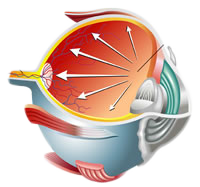What is Glaucoma?

Glaucoma Definition:
Glaucoma is a disease of the eye in which the pressure of fluid inside the eyeball is too high for the healthy functioning of the optic nerve. This is caused by obstructed outflow or hyper-secretion of the fluid. The increased pressure can damage the optic nerve and lead to partial or complete loss of vision.
Glaucoma Risk Factors
While high eye pressure is an important risk factor for the development and progression of glaucoma, it is still only one of many. Some other risk factors include:
- Ethnic background
- Diabetes and related diabetes eye conditions
- High levels of myopia
- Previous trauma to the eye
- Steroid use
- Individuals who have parents with glaucoma
- African Americans over the age of 40
What are the different types of Glaucoma?
Open-angle glaucoma, also called wide-angle glaucoma, is the most common type of glaucoma. The structures of the eye appear normal, but fluid in the eye does not flow properly out of the eye.
Angle-closure glaucoma. Also called acute or chronic angle-closure or narrow-angle glaucoma, this type of glaucoma is less common in the West than in Asia. Poor drainage is caused because the angle between the iris and the cornea is too narrow and is physically blocked by the iris. This condition may lead to a sudden buildup of pressure in the eye.
What are the signs and symptoms of Glaucoma?
The symptoms of glaucoma can be different for each form but in most cases people are not aware until significant damage has been done. Most of this damage does occur to the optic nerve.
Open-Angle Glaucoma Symptoms include:
- Vision loss
- Gradual loss of peripheral vision
Angle-Closure Glaucoma Symptoms include:
- Decreased vision
- Cloudy vision
- Sudden, severe pain, usually in one eye
- Eye feels swollen
- Red eyes
- Halos around lights
- Nausea and vomiting
How is Glaucoma Diagnosed?
Glaucoma is diagnosed in routine eye exams. As we have stated most cases of glaucoma are typically not suspected by patients. They are usually detected in the course of an eye examination or done for some other reason, such as “routine” exams, cataract evaluations, or even follow-up of a patient with macular degeneration. It is much better to discover this before it becomes a problem.
The best defense against glaucoma is regular eye examinations by your ophthalmologist or optometrist. Early detection can mean the difference between normal and lost vision.
Our glaucoma specialists at Southwestern Eye Center are focused on patient well-being and the preservation of vision. Complete a consult request form online or ask one of our scheduling specialists which of our Glaucoma Centers is closest to you by calling 480-854-08185.
Schedule Online Now!
You can book your next eye care appointment entirely online and find an appointment that works perfectly for you.
Our Doctors
Learn more about our glaucoma specialists by clicking on their images below.
Brian M. Chang, M.D.
Cataracts, Glaucoma
Daniel Dansdill, M.D.
Cataracts, Glaucoma
Sunil P. Deokule, M.D.
Cataracts, Glaucoma
Michael B. Horsley, M.D.
Cataracts, Glaucoma
John Malin Lewis, M.D.
Glaucoma
Andrew Rabinowitz, M.D.
Glaucoma





